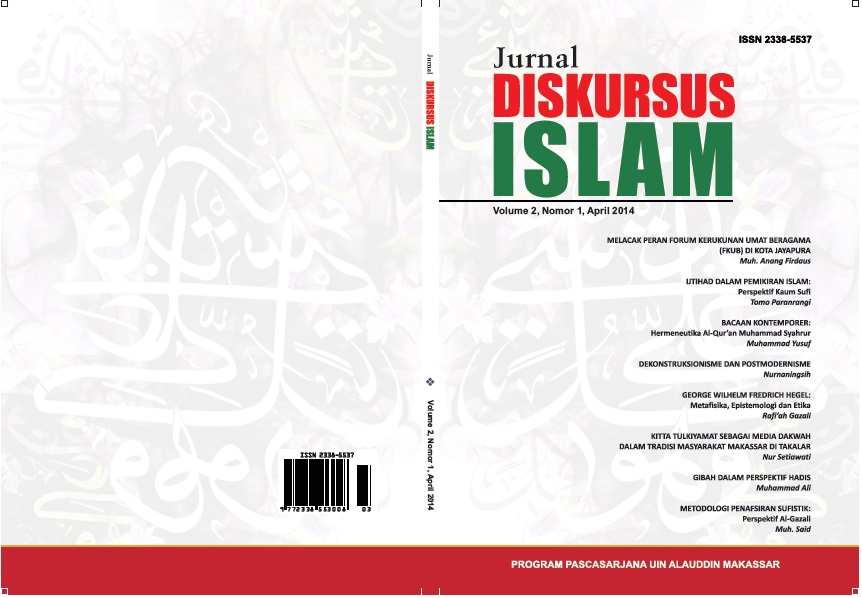GEORGE WILHELM FREDRICH HEGEL : Metafisika, Epistemologi dan Etika
Abstract
Hegel merupakan filosof yang memperkenalkan metode dialektika yang terdiri dari apa yang disebut dengan thesis - antitesis dan sintesis. Namun demikian, pada tahapan berikutnya, sintesis akan berubah menjadi tesis baru yang akan berhadapan dengan antitesis yang baru pula, dan begitulah seterusnya. Logika menurut Hegel bukanlah pengertian logika tradisional (yaitu ajaran tentang bentuk-bentuk dan hukum berfikir), melainkan ilmu yang memandang roh atau idea dalam dirinya, bebas dari ruang dan waktu. Persoalan dialektika yang terdiri dari tesis, antitesis dan sintesis tersebut makin lama makin menanjak. Dimulai dari persoalan tentang waktu dan ruang sebagai tempat kejamakan yang tanpa batas, dimana Idea telah tersesat untuk naik kepersoalan keterbatasan individual, yang akhirnya akan menanjak pada roh yang mutlak, melalui tingkatan yang bermacam-macam.
ABSTRACT
Hegel is a philosopher who introduces dialectic method containing what it is called the thesis- antithesis, and synthesis. However, in next stage, the synthesis would become a new thesis that will be dealing with a new antithesis as well and so on. According to Hegel logic is not the logic of traditional sense (that is, a concept about forms and rules of thinking), but is a science seeing spirit or idea in itself, free from space and time. The matter of the dialectic that consists of thesis, antithesis, and synthesis are becoming more and more uphill. It is started from the question of time and place as space of infinite multiplicity, in which the idea has been lost to reach the question of individual limitation, and eventually will climb to the absolute spirit through various stages.
References
Bakker, A. Metode Penelitian Filsafat. Yogyakarta: Kanisius, 1984.
Edwards, Paul. Encyclopedia of Philosophy. Vol. 3 Mac Millan Publishing Co New York, t.th. Frost, Jr., The Basic Teaching of The Great Philosopy, 1949.
Hadiwiyono, Harun. Seri Sejarah Filsafat 2. Yogyakarta: Kanisius, 1995.
Hamersma, Harry. Tokoh-Tokoh Filsafat Modern. Jakarta: Gramedia, 1992.
Hegel, GWF. Introduction to the Philosophy of History. Indianapolis: Hacket Publishing Company, 1994.
------------------, Faith and Knowledge. Albani: University of New York, 1977.
------------------, Political Philosophy: Problem and Perspectives. London: Cambridges University Press, 1976.
Authors who publish with this journal agree to the following terms:
1) Authors retain copyright and grant the journal right of first publication with the work simultaneously licensed under a Creative Commons Attribution License that allows others to share the work with an acknowledgement of the work's authorship and initial publication in this journal.
2) Authors are able to enter into separate, additional contractual arrangements for the non-exclusive distribution of the journal's published version of the work (e.g., post it to an institutional repository or publish it in a book), with an acknowledgement of its initial publication in this journal.
3)Authors are permitted and encouraged to post their work online (e.g., in institutional repositories or on their website) prior to and during the submission process, as it can lead to productive exchanges, as well as earlier and greater citation of published work (See The Effect of Open Access).








